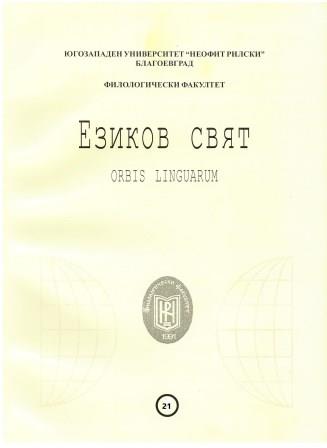АКЦЕНТНИ ХАРАКТЕРИСТИКИ НА МНОГОФУНКЦИОНАЛНИЯ СУФИКС –ЕЦ
ACCENTUAL CHARACTERISTICS OF THE MULTI-PURPOSE SUFFIX -ETS
Author(s): Mirena PatsevaSubject(s): Language and Literature Studies, Theoretical Linguistics, Phonetics / Phonology, Morphology
Published by: ЮГОЗАПАДЕН УНИВЕРСИТЕТ »НЕОФИТ РИЛСКИ«
Keywords: word stress; word formation; multi-purpose suffixes; inflection dependence; distributive morphology; mutational and modificational word-forming type; Bulgarian language
Summary/Abstract: The aim of the study is to analyze the prosodic realization of the different uses of the suffix -ets in order to verify the hypothesis that the prosodic profiles of the multi-purpose suffixes depend on the word-forming type (mutational or modificational). The suffix serves to form nomina agentis (boѐts ‘fighter’), nomina instrumenti (pisèts ‘nib’), nomina attributivа (hubavèts ‘handsome man’), national names - nomina habitatorium (japònets ‘Japanese’), nomina pertinentia (karteziànets ‘Cartesian’) and nomina diminutiva (hlèbets ‘bread’). The analysis shows that added to non-derivative bases, the suffix is marked as stressed when it forms nomina agentis, instrumenti, and nomina attributiva, composed of adjectives. It is pre-accented when it indicates belonging to nationality and is accentually not marked when added to nouns as a diminutive suffix. The suffix receives the word stress when it is associated with unaccented bases, but it is not stressed when it is attached to accented bases by virtue of the so-called inflection dependence (Steriade, Yanovic 2015). Inflectional forms are considered as a "collective basis" when choosing a stress option. Another important factor is the structure of the base (onesyllable or multi-syllable, derived or not). When added to another derivational suffix in a derived stem, -ets cannot affect the accentuation of the first phase of derivation in the logic of the distributive morphology.
Journal: Езиков свят - Orbis Linguarum
- Issue Year: 21/2023
- Issue No: 2
- Page Range: 024-031
- Page Count: 8
- Language: Bulgarian

